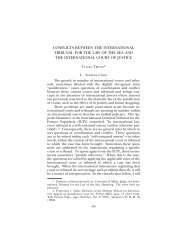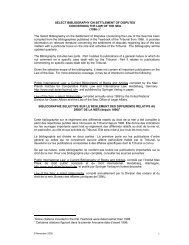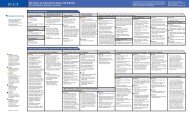John H. Jackson, Fragmentation or Unification Among International ...
John H. Jackson, Fragmentation or Unification Among International ...
John H. Jackson, Fragmentation or Unification Among International ...
You also want an ePaper? Increase the reach of your titles
YUMPU automatically turns print PDFs into web optimized ePapers that Google loves.
830 INTERNATIONAL LAW AND POLITICS [Vol. 31:823A fifth point involves what is happening now in terms ofthe constitutional and jurisprudential developments. From along list, let me mention two concepts that I think are reallyquite striking. First, in this international constraint on domesticeconomic regulation: how much deference should the international<strong>or</strong>ganization give to national government decisions?I think the appellate body and the panel are strugglingwith this question, and I see strong hints in several of the casesthat there will be a concept of deference. There will be anidea that the national governments have to have somethinglike a “margin of appreciation” <strong>or</strong> room to maneuver. Andthere are phrases in those decisions that I have written aboutthat would supp<strong>or</strong>t such a conclusion. 6 Second, anotherclosely related concept is judicial restraint. Indeed, the DisputeSettlement Understanding (DSU) itself obliges thepanels not to make rep<strong>or</strong>ts that would change the rights <strong>or</strong>obligations of the members. I join others who view that provisionas a s<strong>or</strong>t of shot over the bow by the negotiat<strong>or</strong>s whoframe these treaties, warning the panel process not to be toojudicially “active.”A sixth point regards procedures. I will take up just a fewprocedural points with which people are now struggling. Ihave already mentioned the right to counsel, as well as presumptionssuch as prima facie nullification <strong>or</strong> impairment.There is a big discussion of “burden of proof,” and a very interestingquestion of how the panel should receive and utilize scientificevidence that relates to economic regulation. 7 I thinkthere is a wealth of WTO jurisprudence, and some of thisshould now be useable in other parts of international law.This is s<strong>or</strong>t of a two-way flow of influences. The jurisprudenceof the GATT/WTO system as a whole is so much m<strong>or</strong>e extensivethan almost any other international body that it merits ourcloser attention.My seventh point is the question of compliance, which hasbeen pretty good so far. We are now coming to a periodwhere there is anxiety about whether some of the maj<strong>or</strong> powerswill in fact comply with some of the cases that have been6. See id.7. See, e.g., EC Measures Concerning Meat and Meat Products (H<strong>or</strong>mones),Rep<strong>or</strong>t of the Appellate Body, W.T.O. Doc. WT/DS26/AB/R (Jan.16, 1998).






